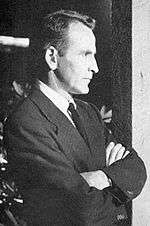Kermit Hunter
Kermit Houston Hunter (3 October 1910 – 11 April 2001) American playwright known primarily for writing historical outdoor dramas.

Born in McDowell County, West Virginia in 1910, Hunter first attended Emory & Henry College in Emory, Virginia before he went on to Ohio State University where he graduated in 1931. During his time at Ohio State, Hunter was initiated into the Theta Delta chapter of the Beta Theta Pi Fraternity.[1] After graduation, he held a number of jobs and joined the U.S. Army in 1940. After rising to the rank of lieutenant colonel, he became the assistant chief of staff of the Caribbean Defense Command. He was later awarded the Legion of Merit. After World War II, he served as the business manager for the North Carolina Symphony.
In 1947, Hunter decided to pursue graduate studies in the Department of Dramatic Arts at the University of North Carolina at Chapel Hill. While enrolled, three of Hunter's plays were produced by the Carolina Playmakers, a dramatic group at the University. When the Cherokee Historical Association began looking for a playwright to write an outdoor drama to be performed in Cherokee, North Carolina, Hunter won the commission and wrote his most famous play Unto These Hills. The play opened July 1, 1950 and still plays on at the Mountainside Theatre. He also wrote the play for the Cherokee Nation based in Tahlequah, OK, The Trail of Tears. This play was performed each summer at the Cherokee Heritage Center located south of Tahlequah until the mid-90's.
After receiving his masters, Hunter remained in Chapel Hill to pursue his Ph.D.. After receiving his Ph.D in 1955, he accepted the position of professor of drama at Hollins College (now Hollins University) in Roanoke, Virginia. Leaving Hollins in 1964, he became the first dean of the Meadows School of Arts at Southern Methodist University in Dallas, Texas. After stepping down as dean in 1976, he remained at Southern Methodist as a writer in residence until 1978. After leaving Southern Methodist he was named as a senior lecturer at the University of Texas at Arlington. He retired in 1993 and died in Dallas on April 11, 2001.
During his extraordinary career, Hunter wrote over 40 historical dramas that were performed all over the United States. Of these dramas, only three, Unto These Hills, Horn in the West in Boone, North Carolina and Honey in the Rock in Beckley, West Virginia, are still performed at present.
Works Published
- Beyond the Sundown
- Brighthope
- Chucky Jack
- Dust in Her Petticoats
- The Eleventh Hour
- Forever This Land
- The Home Road
- Honey in the Rock
- Horn in the West
- The Liberty Tree
- Next Day in the Morning
- Stars in My Crown
- The Bell and The Plow
- The Third Frontier
- The Trail of Tears
- Unto These Hills
- Voice in the Wind
- Walk Towards Sunset
References
- ↑ Makio. Columbus: The Ohio State University. 1919. p. 171.
External links
- http://www.theatrewestvirginia.com/honey-in-the-rock.html
- http://www.horninthewest.com
- http://www.untothesehills.com
- http://www.cherokeehistorical.org/